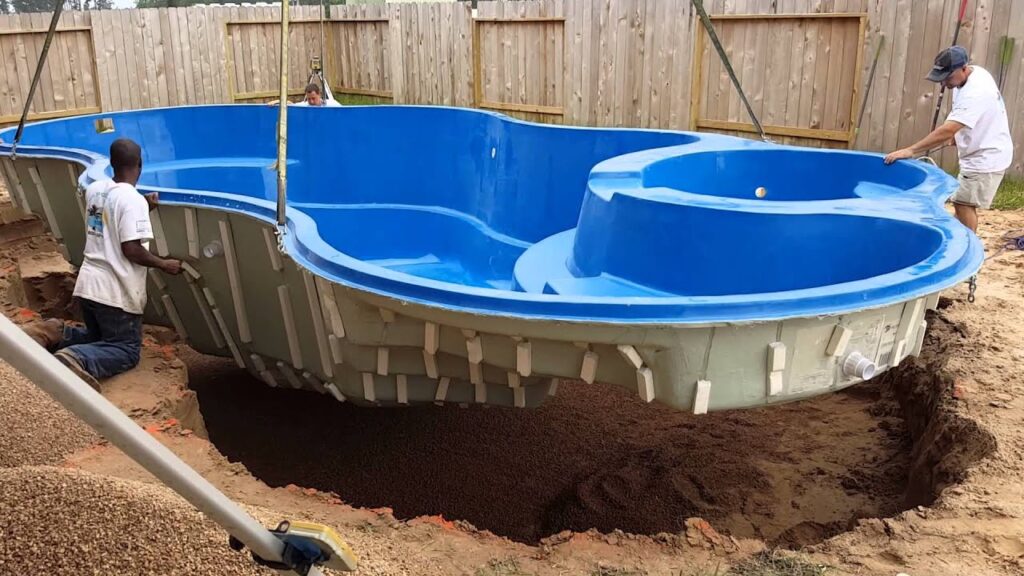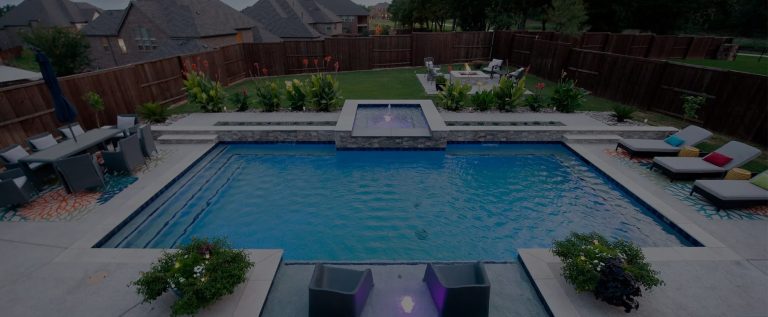Knowing that fiberglass and gunite pools (concrete) are two very different types of pools is a smart place to start if you’re looking to build your own pool even when they seem distinct. Choosing which swimming pool is best for you will become obvious once you understand how the two differ.
Our Pool Builders in NJ will help examine the key distinctions between the two and then go into the advantages and disadvantages, pool installation procedures, pool sizes, and forms, and—most importantly—maintenance following installation.
Table of Contents
What is a Fibreglass Pool?

A fiberglass pool is a manufactured, pre-built fiberglass shell that can be quickly erected as an above-ground (free-standing) or in-ground pool in your selected location. Due to the gel coating that has been put over raw fiberglass, fiberglass pools are renowned for having an extremely smooth texture.
Pros:
- Speedy Installation: Fibreglass pools can be set up and operational in as little as 2-3 days if you seek a speedy installation.
- It often Comes With An Extended Manufacturer’s Warranty: Typically, concrete contractors lack a manufacturer. Hence they lack a manufacturer warranty. If a concrete pool is covered by a guarantee at all, it will normally only cover the builder’s workmanship. The majority of (but not necessarily all) fiberglass pool manufacturers guarantee that every pool bought and installed is free from structural leaks for the pool’s entire lifetime, owing to workmanship and material failures during manufacturing. If buying a fiberglass pool, ask your independent dealer about the guarantee offered by the manufacturer.
- A Pool That Is Simple To Own: As previously indicated, a fiberglass pools’ typical weekly maintenance period is only an hour or so. The gel coat finish of a fiberglass pool is smooth, non-skid, completely non-porous, and non-reactive, so it doesn’t absorb chemicals or alter how well they work. You will use fewer chemicals in a fiberglass pool than you would in a gunite pool because fiberglass pools are resistant to algae because of the smooth gel layer. Fiberglass pools require less upkeep than other pools, necessitating routine vacuuming, skimming, and water testing. The annual cost of a fiberglass pool is reduced because of less time and less chemical input.
- Low Upkeep: It’s because algae cannot adhere to fiberglass’ smooth, nonporous surface. The water in a fiberglass pool will still contain algae, but it won’t be on the walls. As a result, cleaning will take less time, and chemical costs will decrease.
- Durability: Fibreglass pools resist typical wear and tear and environmental factors like sunlight and extreme weather, so they shouldn’t require significant repairs in the future.
- Size Variation: Fibreglass pools can be constructed in various sizes, from 1016 to 1640 feet.
- Less Expensive: fiberglass pools, including equipment, can cost between $55,000 and $70,000, depending on your preferred design and size. This is frequently a less expensive choice than a custom gunite pool.
Cons:
- Lack of Flexibility: Fibreglass pools are manufactured as a shell and delivered to your house completely, limiting the homeowner’s ability to experiment and be creative. They are essentially “off-the-shelf” items you can buy in size and shape.
- Low Availability: fiberglass pools might be in great demand during certain seasons, which can lead to delays and longer wait times for delivery and installation.
- Manufacturing Errors: Bubbles or crazing may form if fiberglass pools are not produced correctly. But if it happens, defects can usually be polished out. Once completed, it’ll look good as it is new.
What is a Gunite Pool?

The most notable feature of a gunite pool is its consistent structural strength. A gunite pool is a concrete swimming pool built from a mixture of sand, cement, and water that is poured using a high-pressure hose. Gunite pool designs may be made to match any form or size and are strong, long-lasting, and tailored to your particular needs and preferences for your pool.
Now that you know more about fiberglass and gunite pools, let’s explore their advantages and disadvantages in more detail.
Pros:
- Flexible design: Gunite is perfect for pools that need to have a certain form, extra huge, or extra deep. On-site, custom-built gunite pools can be created in a style that complements your current landscape design. Even while installing a gunite pool takes longer than installing a fiberglass pool, this method of construction offers greater versatility in terms of shape, size, and depth.
- Additional features: Gunite goes considerably further in this approach than fiberglass if you want a lagoon-style pool with built-in rock formations, waterfalls, or underwater bench seating.
- Customized finishes are offered, including pebble or tile finishes and various colors for gunite plaster. With so many variations, you can be sure to choose a finish that matches the style of your home and landscape.
Cons:
- Maintenance Costs: Gunite pools require more upkeep than fiberglass ones, which increases the expense. Gunite pools should be resurfaced every 7–10 years to preserve them in excellent shape and look brand-new.
- Higher Lifetime Costs: You’ll probably wonder, “Are fiberglass or gunite pools more expensive?” while you do your research on pools. Aside from numerous cost factors, such as pricing variations in temperate climates, there isn’t a significant upfront price difference between the cost of a gunite pool and a fiberglass pool. Their average prices range between $45,000 and $65,000 for both. The pool will need to be maintained once you’ve purchased it, though. This is where the price of concrete pools starts to matter to many customers; a gunite pools’ projected 10-year maintenance costs are roughly $16,000 or more, compared to a fiberglass pools’ estimated $4,500.
- Cracking: Have you ever observed concrete patios outside growing cracks? The same is true with a pool. Because concrete is rigid and cannot bend with the earth, it cracks when the earth moves. You are left with costly repairs and an unattractive pool finish as a result of this brittleness. The elasticity of a fiberglass pool shell helps to shield it from damage when earthquakes.
- Chemical usage: Because gunite pools are made of different materials, more chemicals are needed to maintain them and prevent surface damage.
- Greater Installation Time: Since all the labor is done on-site, installing a gunite pool might take a lengthy time. Your custom-designed pool’s complexity will determine how long it takes to complete the installation from beginning to end.
Fibreglass & Gunite Pool Designs, Forms, And Dimensions
There are several pre-built shapes and sizes available for fiberglass swimming pools. Most fiberglass pool designs fit into one of the following categories:
The diameters of freeform kidney rectangular Roman fiberglass pools vary:
Small sizes:
- 1016-inch by 4-foot rectangle
- Freeform 11x22x5 feet deep
Biggest sizes:
- 8-foot by 16-foot rectangle
- 1640 – freeform 6’6″
The gunite pool offers limitless creativity because it is an in-ground pool that is constructed to order. It may be shaped and sized to complement your landscape perfectly.
How Both are Installed?
Installation of a fiberglass pool is a fairly rapid and simple process. Installation entails dropping the shell into the prepared hole and connecting the plumbing because the shell is pre-built by the manufacturer.
A gunite pool requires substantially more installation and construction work because everything must be done onsite. While designing and constructing a gunite concrete pool usually takes weeks or even months, a fiberglass pool may be constructed in a few days.



